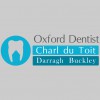
Here at Studental dental care for Oxford, our highly skilled and qualified Dental Professional focus on providing our Patients best possible care they can expect. Our Team is passionate about our Commitment to provide the highest level of dental treatment be it in under NHS or private treatment. Dentistry is simple, patients need prevention, treatment and maintenance.
We at Studental have a system to deliver this in a caring, professional and respectful way. We are committed to providing our Dental Services to the Oxford residences and not only to Students and University Staff. We are celebrating our 10th year as a member of the BDA Good Practice accreditation. We continue to be rated the "Three Best Rated" for the last five years.
At Studental, your smile really matters. We understand the value of a beautiful smile and our aim is to bring our patients a natural smile full of confidence. With our talented team of experienced dental professionals who are dedicated to perfecting your smile and improving your overall health with an extraordinary level of skills and expertise.
We at Studental have a system to deliver this in a caring, professional and respectful way. We are committed to providing our Dental Services to the Oxford residences and not only to Students and University Staff. We are celebrating our 10th year as a member of the BDA Good Practice accreditation. We continue to be rated the "Three Best Rated" for the last five years.
At Studental, your smile really matters. We understand the value of a beautiful smile and our aim is to bring our patients a natural smile full of confidence. With our talented team of experienced dental professionals who are dedicated to perfecting your smile and improving your overall health with an extraordinary level of skills and expertise.
Services
All our dentists adhere to the strict guidelines governing the profession under strict guidance from the General Dental Council (GDC) "Standards for Dental Professionals".
Our team of dentists and their support staff are committed to creating a friendly and personal environment while providing high quality dental treatment.
Kruti graduated from Kings College London (BDS) in 2011 before completing her vocational training.
She has worked in both general practice and in hospital at the maxillofacial unit at the John Radcliffe Hospital.
Our team of dentists and their support staff are committed to creating a friendly and personal environment while providing high quality dental treatment.
Kruti graduated from Kings College London (BDS) in 2011 before completing her vocational training.
She has worked in both general practice and in hospital at the maxillofacial unit at the John Radcliffe Hospital.
This procedure is recommended when a patient shows significant signs of gum disease.
These signs may include the finding of deep gum pockets of over 5mm, bone loss that may be visible on x-rays and probing, bleeding gums and inflammation.
Debridement procedures are generally completed half mouth at a time, and usually require local anaesthetic and often the application of antibiotic gel into affected tissues.
Expect 2-4 appointments for completion.
Plaque bacteria and tarter is removed above and below the gum line throughout the process.
These signs may include the finding of deep gum pockets of over 5mm, bone loss that may be visible on x-rays and probing, bleeding gums and inflammation.
Debridement procedures are generally completed half mouth at a time, and usually require local anaesthetic and often the application of antibiotic gel into affected tissues.
Expect 2-4 appointments for completion.
Plaque bacteria and tarter is removed above and below the gum line throughout the process.
When the pulp gets infected/inflamed it manifests mainly as severe toothache however, on occasions the symptoms can be milder.
There are several reasons the pulp can get infected/inflamed incl.
Root canal treatment is most of the time painless as local anaesthetic is used.
After treatment the tooth may be painful for a couple of days until the surrounding inflamed tissues settle down.
Ideally following root canal treatment a crown is required to prevent fracture of the tooth.
50% of root treated teeth fracture in the first 5 years after treatment.
There are several reasons the pulp can get infected/inflamed incl.
Root canal treatment is most of the time painless as local anaesthetic is used.
After treatment the tooth may be painful for a couple of days until the surrounding inflamed tissues settle down.
Ideally following root canal treatment a crown is required to prevent fracture of the tooth.
50% of root treated teeth fracture in the first 5 years after treatment.
Crowns are an ideal way to rebuild teeth, which are heavily broken down, weakened by decay/large fillings or root canal treatment.
The crown fits over the remaining tooth to add strength and give it the shape and contour of a natural tooth.
Modern crowns can be made from many different materials.
These can be Gold, metal alloys, porcelain or zirconia.
They can even be made for a combination of metal and porcelain to provide strength and that natural appearance.
There are advantages and disadvantages to each material, which your dentist can go through with you.
The crown fits over the remaining tooth to add strength and give it the shape and contour of a natural tooth.
Modern crowns can be made from many different materials.
These can be Gold, metal alloys, porcelain or zirconia.
They can even be made for a combination of metal and porcelain to provide strength and that natural appearance.
There are advantages and disadvantages to each material, which your dentist can go through with you.
Bridges provide a fixed and permanent way of replacing missing teeth.
Conventional bridges are made by crowning teeth on either side or both sides of the gap and attaching a false tooth to replace the missing one.
Strong teeth either side of the gap and good support are needed for successful bridge work.
Adhesive bridges or resin-bonded bridges (commonly known as 'sticky bridges') are available in certain situations and are more conservative than conventional bridges.
Bridges can be made from a number of materials including: metal alloys, gold alloys, porcelain and zirconia.
Conventional bridges are made by crowning teeth on either side or both sides of the gap and attaching a false tooth to replace the missing one.
Strong teeth either side of the gap and good support are needed for successful bridge work.
Adhesive bridges or resin-bonded bridges (commonly known as 'sticky bridges') are available in certain situations and are more conservative than conventional bridges.
Bridges can be made from a number of materials including: metal alloys, gold alloys, porcelain and zirconia.
Reviews

Be the first to review Studental.
Write a Review

